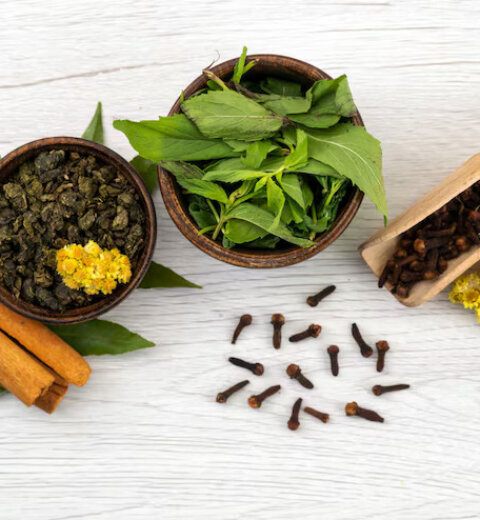In Ayurveda, food is not just sustenance — it’s medicine, energy, and a tool for maintaining balance with nature. One of the most powerful principles in Ayurvedic nutrition is “Ritucharya”, or seasonal regimen. This ancient wisdom teaches us how to align our diet and lifestyle with the changing seasons to stay healthy, balanced, and disease-free.
Seasonal eating isn’t a modern trend — it’s a timeless practice deeply rooted in the rhythms of nature and your body’s shifting needs throughout the year. In this guide, we explore Ayurvedic dietary recommendations for each of the six Ritus (seasons), and how embracing them can improve your well-being.
1. Shishira (Late Winter: Mid-January to Mid-March)
Dominant Dosha: Kapha starts to accumulate
Qualities: Cold, dry, heavy
What to Eat:
- Warm, light, and mildly spicy foods
- Grains like barley, millet, and oats
- Spices like ginger, black pepper, cinnamon
- Soups, stews, and cooked vegetables
Avoid:
- Cold, oily, and heavy foods (cheese, fried items)
- Ice-cold drinks
Why it Matters: Your digestive fire (Agni) is strong in late winter, so nourish yourself well, but focus on foods that prevent Kapha buildup and stagnation.
2. Vasanta (Spring: Mid-March to Mid-May)
Dominant Dosha: Kapha
Qualities: Moist, heavy, cool
What to Eat:
- Light, dry, and warm foods
- Bitter and pungent vegetables like spinach, mustard greens, and fenugreek
- Herbal teas (ginger, tulsi, cinnamon)
- Legumes like mung beans and lentils
Avoid:
- Dairy, sweets, and overly oily or fried foods
- Cold and heavy grains (rice, wheat in excess)
Why it Matters: Spring is the prime season for detox. Eating light and spicy foods helps counter the sluggishness and mucus accumulation associated with Kapha.
3. Grishma (Summer: Mid-May to Mid-July)
Dominant Dosha: Pitta begins to accumulate
Qualities: Hot, dry, intense
What to Eat:
- Cooling, hydrating foods
- Sweet fruits like watermelon, grapes, mangoes
- Cucumber, coconut water, and leafy greens
- Cooling herbs like mint, coriander, fennel
Avoid:
- Spicy, salty, and sour foods
- Fermented foods, red meat, and alcohol
Why it Matters: Summer depletes energy and fluids. Focus on foods that soothe Pitta and hydrate the body while avoiding anything that heats you up internally.
4. Varsha (Monsoon: Mid-July to Mid-September)
Dominant Dosha: Vata and aggravated Pitta
Qualities: Moist, cool, unstable
What to Eat:
- Warm, light, and easily digestible meals
- Soups with ginger and black pepper
- Steamed vegetables and rice
- Herbal teas with dry ginger and tulsi
Avoid:
- Raw foods, leafy salads, and uncooked sprouts
- Cold beverages and refrigerated leftovers
Why it Matters: Digestive fire weakens during the rainy season. Favor warm, clean foods that are easy on the gut and prevent Ama (toxins) buildup.
5. Sharad (Autumn: Mid-September to Mid-November)
Dominant Dosha: Pitta
Qualities: Sharp, hot, clear
What to Eat:
- Cooling and sweet foods
- Milk, ghee, rice, and pumpkin
- Pomegranate, amla, and coconut
- Herbs like licorice and sandalwood-infused water
Avoid:
- Spicy, oily, and sour foods
- Pickles, fermented dishes, and tomatoes
Why it Matters: Pitta is at its peak in autumn. Balance the fire with sweet, bitter, and cooling foods to prevent acidity, inflammation, and irritability.
6. Hemanta (Early Winter: Mid-November to Mid-January)
Dominant Dosha: Vata and a slight increase in Kapha
Qualities: Cold, dry, windy
What to Eat:
- Nourishing, warm, and oily foods
- Whole grains, dairy, nuts, root vegetables
- Soups, ghee, and spiced milk
- Sweet and salty tastes to ground Vata
Avoid:
- Cold and dry foods like crackers and raw salads
- Skipping meals or fasting excessively
Why it Matters: Early winter is a good time to nourish and strengthen the body. Agni is strong, and the body craves warmth and sustenance.
🌿 Why Seasonal Eating Matters in Ayurveda
- Balances Doshas: Helps prevent seasonal imbalances and related health issues
- Boosts Immunity: Strengthens your immune system by aligning with nature’s cycles
- Enhances Digestion: Supports optimal Agni by choosing foods your body can easily process
- Improves Mental Health: Reduces seasonal mood swings and mental unrest
✨ Embrace Ayurveda with Guidance from Experts
Understanding Ritucharya can be transformative, but personalizing it based on your Prakriti (constitution) makes it even more powerful. At Vaidhakim, we connect you with experienced Ayurvedic doctors who provide custom dietary and lifestyle plans that align with your dosha and the season.
Whether you’re looking to cleanse, boost immunity, or simply live in sync with nature, Vaidhakim makes Ayurveda accessible and practical for modern life.
Start your seasonal wellness journey today with expert Ayurvedic care at Vaidhakim 🌿





